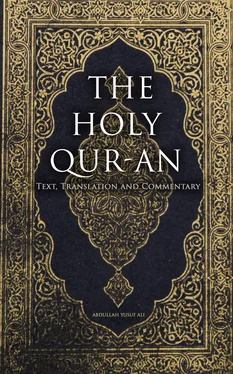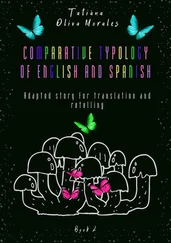Abdullah Ali - The Holy Qur-an - Text, Translation and Commentary
Здесь есть возможность читать онлайн «Abdullah Ali - The Holy Qur-an - Text, Translation and Commentary» — ознакомительный отрывок электронной книги совершенно бесплатно, а после прочтения отрывка купить полную версию. В некоторых случаях можно слушать аудио, скачать через торрент в формате fb2 и присутствует краткое содержание. Жанр: unrecognised, на английском языке. Описание произведения, (предисловие) а так же отзывы посетителей доступны на портале библиотеки ЛибКат.
- Название:The Holy Qur-an: Text, Translation and Commentary
- Автор:
- Жанр:
- Год:неизвестен
- ISBN:нет данных
- Рейтинг книги:5 / 5. Голосов: 1
-
Избранное:Добавить в избранное
- Отзывы:
-
Ваша оценка:
- 100
- 1
- 2
- 3
- 4
- 5
The Holy Qur-an: Text, Translation and Commentary: краткое содержание, описание и аннотация
Предлагаем к чтению аннотацию, описание, краткое содержание или предисловие (зависит от того, что написал сам автор книги «The Holy Qur-an: Text, Translation and Commentary»). Если вы не нашли необходимую информацию о книге — напишите в комментариях, мы постараемся отыскать её.
The Holy Qur-an: Text, Translation and Commentary — читать онлайн ознакомительный отрывок
Ниже представлен текст книги, разбитый по страницам. Система сохранения места последней прочитанной страницы, позволяет с удобством читать онлайн бесплатно книгу «The Holy Qur-an: Text, Translation and Commentary», без необходимости каждый раз заново искать на чём Вы остановились. Поставьте закладку, и сможете в любой момент перейти на страницу, на которой закончили чтение.
Интервал:
Закладка:
3. Āl-i-'Imrān, or The Family of 'Imrān
Table of Contents
Introduction and Summary
Introduction To Sūra 3 (Āl-i-'Imrān).
This Sūra is cognate to Sūra 2, but the matter is here treated from a different point of view. The references to Badr (Ramaḏẖān, H. 2) and Uḥud (Shawwāl, H. 3) give a clue to the dates of those passages.
Like Sūra 2, it takes a general view of the religious history of mankind, with special reference to the People of the Book, proceeds to explain the birth of the new People of Islam and their ordinances, insists on the need of struggle and fighting in the cause of Truth, and exhorts those who have been blessed with Islam to remain constant in Faith, pray for guidance, and maintain their spiritual hope for the Future.
The new points of view developed are: (1) The emphasis is here laid on the duty of the Christians to accept the new light; the Christians are here specially appealed to, as the Jews were specially appealed to in the last Sūra; (2) the lessons of the battles of Badr and Uḥud are set out for the Muslim community; and (3) the responsibilities of that community are insisted on both internally and in their relations to those outside.
Summary. —God having revealed His Book, confirming previous revelations, we must accept it in all reverence, try to understand its meaning, and reject the base motives which make Truth unacceptable to those who reject Faith. (3:1-20, and C. 54.)
The People of the Book had only a portion of the Book and if they reject the complete Book, the People of Faith must part company with them, and their day is done. (3:21-30, and C. 55.)
The story of the family of 'Imrān (the father of Moses) leads us from the Mosaic Dispensation to the miracles connected with the birth of Jesus and his ministry. (3:31-63, and C. 56.)
God's revelation being continuous, all people are invited to accept its completion in Islam, and controversies are deprecated. The Muslims are asked to hold together in union and harmony, and are promised security from harm from their enemies, and enjoined to seek friendship among their own people. (3:64-120, and C. 57.)
The battle of Badr showed how God helps and upholds the virtuous, and how patience, perseverance, and discipline find their reward; on the other hand, the lessons of Uḥud must be learnt, not in despair, but in the exercise of the higher virtues and in contempt of pain and death. (3:121-148, and C. 58.)
The misfortunes at Uḥud are shown to be due to the indiscipline of some, the indecision and selfishness of others, and cowardice on the part of the Hypocrites, but no enemy can hurt God's Cause. (3:149-180, and C. 59.)
The taunts of the enemy should be disregarded, and sincere prayer offered to God, Who would grant His servants success and prosperity. (3:181-200, and C. 60.)
Confirmation of previous Revelations: Acceptance of Faith, 3:1-20
C. 54.(3:1-20)—The Qur'ān revelation has, step by step,
Confirmed the Law of Moses and the Gospel
Of Jesus. It is a guide from God,
And appeals to reason and understanding.
Let us understand it rightly, in reverence
And truth, unswayed by those who reject
Faith, and seeking ever the reward
Of the pleasure of God, through firmness,
Patience, discipline, and charity, and offering others
The light which we have ourselves received.
Sūra 3.
Āl-i-'Imrān , or The Family of 'Imrān.
In the name of God, Most Gracious, Most Merciful
1Alif Lam Mim.
2God! There is no god but He,—the Living, the Self-Subsisting, Eternal.
3It is He Who sent down to thee (step by step), in truth, the Book, confirming what went before it; and He sent down the Law (of Moses) and the Gospel (of Jesus) before this, as a guide to mankind, and He sent down the Criterion (of judgment between right and wrong).
4Then those who reject Faith in the Signs of God will suffer the severest penalty, and God is Exalted in Might, Lord of Retribution.
5From God, verily nothing is hidden on earth or in the heavens.
6He it is Who shapes you in the wombs as He pleases. There is no god but He, the Exalted in Might, the Wise.
7He it is Who has sent down to thee the Book: In it are verses basic or fundamental (of established meaning); they are the foundation of the Book: others are allegorical. But those in whose hearts is perversity follow the part thereof that is allegorical, seeking discord, and searching for its hidden meanings, but no one knows its hidden meanings except God. And those who are firmly grounded in knowledge say: "We believe in the Book; the whole of it is from our Lord:" and none will grasp the Message except men of understanding.
8"Our Lord!" (they say), "Let not our hearts deviate now after Thou hast guided us, but grant us mercy from Thine own Presence; for Thou art the Grantor of bounties without measure.
9"Our Lord! Thou art He that will gather mankind together against a day about which there is no doubt; for God never fails in His promise."
Section 2.
10Those who reject Faith,—neither their possessions nor their (numerous) progeny will avail them aught against God: they are themselves but fuel for the Fire.
11(Their plight will be) no better than that of the people of Pharaoh, and their predecessors: they denied our Signs, and God called them to account for their sins. For God is strict in punishment.
12Say to those who reject Faith: "Soon will ye be vanquished and gathered together to Hell,—an evil bed indeed (to lie on)!
13"There has already been for you a Sign in the two armies that met (in combat): One was fighting in the cause of God, the other resisting God; these saw with their own eyes twice their number. But God doth support with His aid whom He pleaseth. In this is a warning for such as have eyes to see."
14Fair in the eyes of men is the love of things they covet: Women and sons; Heaped-up hoards of gold and silver; horses branded (for blood and excellence); and (wealth of) cattle and well-tilled land. Such are the possessions of this world's life; but in nearness to God is the best of the goals (to return to).
15Say: Shall I give you glad tidings of things Far better than those? For the righteous are Gardens in nearness to their Lord, with rivers flowing beneath; therein is their eternal home; with Companions pure (and holy); and the good pleasure of God. For in God's sight are (all) His servants,—
16(Namely), those who say: "Our Lord! we have indeed believed: forgive us, then, our sins, and save us from the agony of the Fire;"—
17Those who show patience, firmness and self-control; who are true (in word and deed); who worship devoutly; who spend (in the way of God); and who pray for forgiveness in the early hours of the morning.
18There is no god but He: that is the witness of God, His angels, and those endued with knowledge, standing firm on justice. There is no god but He, the Exalted in Power, the Wise.
19The Religion before God is Islam (submission to His Will): Nor did the People of the Book dissent therefrom except through envy of each other, after knowledge had come to them. But if any deny the Signs of God, God is swift in calling to account.
20So if they dispute with thee, say: "I have submitted my whole self to God and so have those who follow me." And say to the People of the Book and to those who are unlearned: "Do ye (also) submit yourselves?" If they do, they are in right guidance, but if they turn back, thy duty is to convey the Message; and in God's sight are (all) His servants.
Partial Truths, and the Completed Book of God: Friendship with one's own people, 3:21-30
Интервал:
Закладка:
Похожие книги на «The Holy Qur-an: Text, Translation and Commentary»
Представляем Вашему вниманию похожие книги на «The Holy Qur-an: Text, Translation and Commentary» списком для выбора. Мы отобрали схожую по названию и смыслу литературу в надежде предоставить читателям больше вариантов отыскать новые, интересные, ещё непрочитанные произведения.
Обсуждение, отзывы о книге «The Holy Qur-an: Text, Translation and Commentary» и просто собственные мнения читателей. Оставьте ваши комментарии, напишите, что Вы думаете о произведении, его смысле или главных героях. Укажите что конкретно понравилось, а что нет, и почему Вы так считаете.












